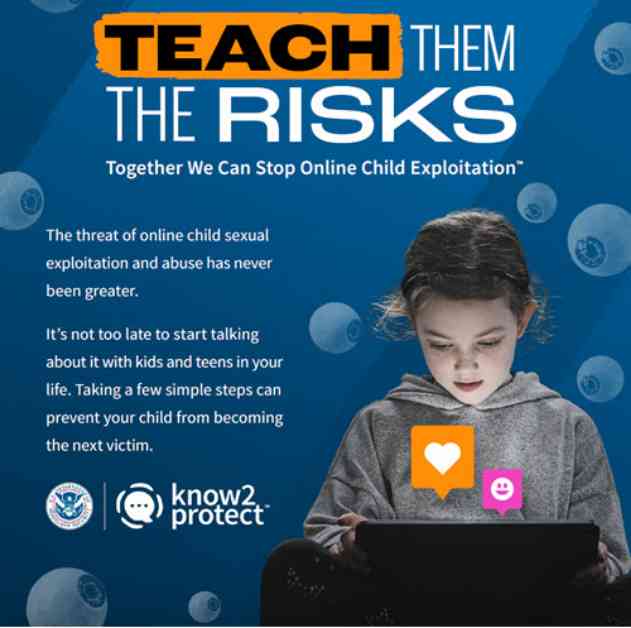Protecting Students: DHS Launches New Initiatives to Combat Online Child Exploitation
In a bid to safeguard children and teens from the dangers of online child sexual exploitation and abuse (CSEA), the Department of Homeland Security (DHS) has introduced a range of resources tailored for educators, school administrators, coaches, and other adults who interact with young people. The Know2Protect campaign, part of the DHS’s national public awareness initiative, is now offering specialized tips and classroom materials designed to educate educators on the importance of internet safety and empower them to protect their students.
The Back2School campaign, a new component of Know2Protect, aims to raise awareness among teachers, school administrators, and other adults who play a crucial role in the lives of children. By equipping these trusted individuals with the knowledge and tools to identify and prevent online CSEA, DHS hopes to create a safer online environment for young people.
Secretary of Homeland Security Alejandro N. Mayorkas emphasized the urgency of the issue, citing the alarming statistic of over 36 million reports of online child sexual exploitation worldwide last year. He stressed the vital role that educators and school administrators play in helping children recognize and report instances of online abuse, ultimately protecting them from harm.
Partnering with various educational associations and youth-serving organizations, the Back2School campaign is set to reach a wide audience of students during the academic year. Glen Pounder, Senior Vice President and Chief Safeguarding Officer at Scouting America, commended the initiative, highlighting the importance of collaboration in safeguarding children online.
The National Center for Missing & Exploited Children (NCMEC) also expressed its support for the campaign, underscoring the critical role of educational tools in protecting children from online threats. Chief Operating Officer Derrick Driscoll emphasized the need for collective action to ensure every child has a safe childhood.
American Federation of Teachers President Randi Weingarten acknowledged the dedication of educators in safeguarding students and their families from online exploitation. She emphasized the importance of working together with DHS to address the evolving threat of online child abuse.
Teach For America CEO Elisa Villanueva Beard echoed these sentiments, highlighting the link between students’ sense of safety and their ability to learn. She emphasized the significance of the Know2Protect campaign in raising awareness of online threats and empowering adults to protect children from harm.
Bennett College President Suzanne Walsh praised the Back2School resources for consolidating essential information in one accessible location, making it easier for adults to support students in navigating the online world safely.
With one in five children receiving unwanted sexual solicitations online each year, educating young people about the risks of online predators is paramount. To this end, Know2Protect has developed a range of age-appropriate resources to help kids, teens, and parents stay safe online.
The campaign’s Resources2Educate include iGuardian Training Videos and Tips2Identify Exploitation and Abuse for Educators, while Resources2Send Home feature tools like the Family Online Safety Agreement and Internet Safety Checklist. Classroom resources like printable posters and activities such as crossword puzzles and coloring pages aim to engage students in learning about online safety.
In addition to these resources, educators and administrators can book free in-person or virtual training sessions for their schools or organizations. These educational presentations, led by special agents from Homeland Security Investigations (HSI) and the U.S. Secret Service, aim to equip adults with the knowledge and skills to protect children from online exploitation.
Know2Protect has already educated over 82,900 individuals and conducted over 1,000 events and presentations to raise awareness of online CSEA. The campaign’s goal is to reach over 100,000 people through trainings by the end of the school year, underscoring its commitment to preventing online child exploitation.
Building on its partnerships with technology companies, sports leagues, and youth-serving organizations, Know2Protect is expanding its reach through collaborations with organizations like the National Association of Police Athletic/Activities Leagues (PAL) and Lamar Advertising. By disseminating educational content through various channels, the campaign aims to educate more individuals on online safety.
Project iGuardian, Know2Protect’s educational arm, is teaming up with NASCAR to provide online safety tips for children and parents, while digital billboards across the country feature public service announcements from Know2Protect. These initiatives aim to raise awareness of online threats and empower individuals to protect themselves and their families.
As the first federal government campaign focused on online CSEA education and prevention, Know2Protect plays a crucial role in mobilizing communities to combat this crime. By equipping young people, parents, educators, and community leaders with the tools to recognize and prevent online exploitation, the campaign strives to create a safer online environment for children.
Early intervention is key in addressing online exploitation, and individuals are urged to report any suspicious activity to the Know2Protect Tipline or the NCMEC CyberTipline. By working together to address online threats, communities can protect children from harm and create a safer online environment for all.

